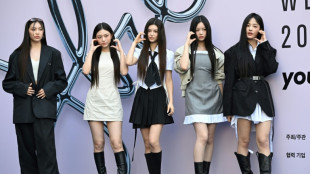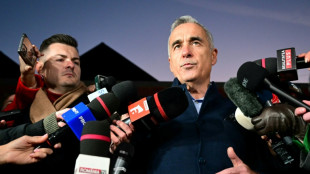
-
 British MPs debate contentious assisted dying law
British MPs debate contentious assisted dying law
-
Macron offers first glimpse of post-fire Notre Dame

-
 Syria jihadists, allies shell Aleppo in shock offensive
Syria jihadists, allies shell Aleppo in shock offensive
-
Japan government approves $92 bn extra budget

-
 Toll in Syria jihadist-army fighting rises to 242: monitor
Toll in Syria jihadist-army fighting rises to 242: monitor
-
UK transport secretary quits in setback for Starmer

-
 Days before deadline, plastic treaty draft highlights disagreement
Days before deadline, plastic treaty draft highlights disagreement
-
Crypto boss eats banana art he bought for $6.2 million

-
 Teen news boss criticises Australian social media ban
Teen news boss criticises Australian social media ban
-
Taiwan detects 41 Chinese military aircraft, ships ahead of Lai US stopover

-
 Spain urged to 'build differently' after deadly floods
Spain urged to 'build differently' after deadly floods
-
WTO chief faces heavy task as Trump threat looms

-
 Herbert takes control at Australian Open as Smith tanks
Herbert takes control at Australian Open as Smith tanks
-
Israel PM again warns Iran after top diplomat talks of revising nuclear doctrine

-
 Brilliant Brook's 132 puts England on top against sloppy New Zealand
Brilliant Brook's 132 puts England on top against sloppy New Zealand
-
Brilliant Brook's 132 puts England on top against New Zealand

-
 US landmine offer to Ukraine throws global treaty into 'crisis': campaign group
US landmine offer to Ukraine throws global treaty into 'crisis': campaign group
-
Singapore hangs 4th person in three weeks

-
 Five things to know about NewJeans' shock split from agency
Five things to know about NewJeans' shock split from agency
-
Waste pickers battle for recognition at plastic treaty talks

-
 Ireland votes in closely fought general election
Ireland votes in closely fought general election
-
Top UN court to open unprecedented climate hearings

-
 European countries that allow assisted dying
European countries that allow assisted dying
-
British MPs to debate contentious assisted dying law

-
 Schmidt not expecting hero's welcome on Ireland return
Schmidt not expecting hero's welcome on Ireland return
-
PSG stuck between domestic dominance and Champions League woes

-
 'Hot fight' as unbeaten Bayern visit Dortmund fortress
'Hot fight' as unbeaten Bayern visit Dortmund fortress
-
Bordeaux-Begles' Samu 'not finished yet' with Wallabies

-
 Brook and Pope half-centuries haul England to 174-4 against NZ
Brook and Pope half-centuries haul England to 174-4 against NZ
-
Yen rallies on rate hike bets as equity markets swing

-
 Ukraine superstar Mahuchikh brings 'good vibes' to her war-torn country
Ukraine superstar Mahuchikh brings 'good vibes' to her war-torn country
-
PlayStation at 30: How Sony's grey box conquered gaming

-
 Saudi Arabia hosts UN talks on drought, desertification
Saudi Arabia hosts UN talks on drought, desertification
-
PlayStation: Fun facts to know as Sony's console turns 30

-
 Nepal's first transgender candidates run for local office
Nepal's first transgender candidates run for local office
-
Father of PlayStation says 'everyone told us we would fail'

-
 Ireland seek to overcome former coach Schmidt's Wallabies
Ireland seek to overcome former coach Schmidt's Wallabies
-
Detroit survive Bears comeback to make it 10 wins in a row

-
 Mexican actor Silvia Pinal dead at 93
Mexican actor Silvia Pinal dead at 93
-
'Black Friday' deals target inflation-weary US consumers

-
 Liverpool look to deepen Man City crisis, Amorim seeks first Premier League win
Liverpool look to deepen Man City crisis, Amorim seeks first Premier League win
-
Police fire rubber bullets, tear gas at Georgia protesters after PM delays EU bid

-
 England lose three quick wickets in reply to New Zealand's 348
England lose three quick wickets in reply to New Zealand's 348
-
Social media companies slam Australia's under-16 ban

-
 Police fire tear gas at Georgia protesters after PM delays EU bid
Police fire tear gas at Georgia protesters after PM delays EU bid
-
Canada watchdog sues Google over 'anti-competitive' ad tech

-
 Hojlund gives Amorim winning Old Trafford bow, Roma hold Spurs
Hojlund gives Amorim winning Old Trafford bow, Roma hold Spurs
-
Amorim wins first Man Utd home game after rollercoaster ride

-
 France arrests 26 as South Asian migrant trafficking ring smashed
France arrests 26 as South Asian migrant trafficking ring smashed
-
At least 15 dead, 113 missing, in Uganda landslides


Spurred by TikTok, some Americans return to cash to curb spending
Manicured fingers meticulously place cash in transparent envelopes marked "food," "gas" and other categories, demonstrating in a TikTok video a retro technique for controlling what you spend that is newly popular with some money-conscious Americans.
Returning to cash to control spending may be old fashioned, but in an era of high inflation, a growing number of consumers find that it works.
Judia Griner, 25, started "cash stuffing" two years ago when she was a student at Old Dominion University in Virginia. Now, her TikTok account has more than 200,000 followers.
"I was like, I need to somehow use my own money to pay off the tuition so I won't be in too much debt," Griner told AFP.
"I realized that I had no idea how to do that, because I just didn't know how much money I had," she said.
"I would swipe my card, and I would just kind of cross my fingers and hope that it wouldn't be declined."
It was a similar situation for 31-year-old Jasmine Taylor, who launched her Tiktok channel in February 2021 and now has more than 620,000 followers.
"I had a degree but no outlook for a job. My finances were bad," Taylor, a Texan, said. "I was a pretty big impulse shopper."
Both women decided the way to turn around their spending behavior was to rely on the technique of paying cash for everything.
Once they cash in their pay checks, they separate it into different envelopes for specific expenses -- rent, shopping, etc.
On TikTok, the hashtag #cashstuffing has now reached more than 930 million views.
- Old method, proven results -
The method is reminiscent of the age-old piggy bank system, and was popularized in its current form 20 years ago by financial guru Dave Ramsey, before the era of smartphones and contactless payments.
Despite being outdated and at times inconvenient -- some businesses refuse to accept cash -- the method has allowed Griner to save $7,500 to finance her education.
"The card didn't feel like real money to me," Griner said.
But using cold cash made it very real.
"I could physically see myself spending all my cash and it just went away and that's what helped me curb my spending," she said.
Taylor, too, saw immediate results. She pays 95 percent of her expenses in cash, got rid of $32,000 in student debt, $8,000 in credit card debt and $5,000 in health care debt.
Wracking up debt is a national affliction in a country with abundant credit card offerings that goad households to take on more and more loans.
"It's a problem that my generation kind of suffers from: consumerism and just overspending everything," Griner said.
- Sense of comfort -
For Priya Malani, founder of Stash Wealth, a financial advisory service for young professionals, the economic downturn plays a role in the current success of the envelope system.
"With so many insane headlines -- crypto crashes, market pullbacks, looming recession, the list goes on -- it makes sense that people are looking for a little more control," Malani said.
"A dollar bill you hold in your hand provides that comfort."
But, Jason Howell, a wealth management professor at American University warned that "2023 is probably the worst time to keep your cash in your house" because it earns no interest and depreciates.
Taylor, who keeps her envelopes stuffed with small bills in a fireproof safe in her home, is well aware of this. She still deposits money in the bank when she saves $1,000 or more.
The two experts acknowledge that there is no broader movement back to cash in the United States, where the trend has been the gradual decline of cash in favor of card or mobile payments.
In 2022, about four in ten Americans (41 percent) said they would not make any cash purchases in a typical week, compared to only 24 percent in 2015, according to a recent Pew Research Center study.
According to Griner, the envelope method still represents "the perfect kind of system for a beginner" to manage a budget.
For her, the change has been dramatic: "I trust myself with money."
Howell said that sense of control is a notable achievement.
"It makes you think, it's the greatest benefit of this system," Howell said.
O.Bulka--BTB

